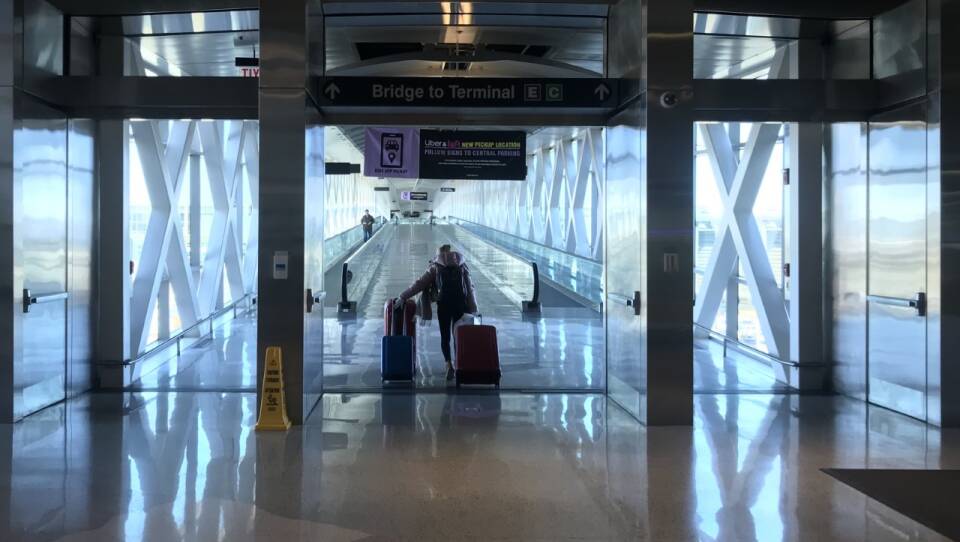Logan International Airport is experiencing an uptick of confiscated firearms at security checkpoints.
Transportation Security Administration officials at the airport discovered 18 firearms packed in passengers' luggage so far this year. That’s significantly more than the 11 found in 2020, when the pandemic kept many travelers at home. The agency said the last time it found 18 firearms at Logan Airport was in 2019, and it wants the public to be vigilant about following the rules to safely travel with guns.
“Passengers are allowed to travel with their firearms and ammunition as long as they follow the proper procedures,” said Bob Allison, TSA’s federal security director for Massachusetts and Maine, in a statement. “Travelers should never bring a gun — loaded or unloaded — to a security checkpoint, because they are not permitted to be carried into the cabin of a plane. Carelessly traveling with a firearm is a public safety concern, considering it could accidentally be discharged during a search.”
Where local firearm possession laws permit — including Massachusetts — passengers in the United States can travel with firearms in checked baggage if it’s in a locked, hard-sided case. A passenger cannot bring a gun aboard a plane, regardless of if they have a concealed weapon permit.
If passengers travel with ammunition, it has to be in its original box and can be packed inside the hard-side case next to the firearm. The case has to be presented at the airline check-in counter. Airline representatives must informed of a passenger's intention to travel with a firearm, along with a form declaring that. The case is assessed in a checked baggage scanner, and goes into the cargo hold of a plane.
Michael Portelli, the supervisory transportation inspector for Logan Airport’s TSA, said gun-owning travelers can make several mistakes when preparing a gun for travel.
“First, that it's not locked. Second would be that it's in the soft-sided container, that would be like, in a canvas bag — which would not be acceptable. The last thing would be with that they would not declare it to the airline. The airline needs to know its flying,” he said. On top of the TSA's rules, many airlines also have their own requirements for passengers traveling with firearms.
The majority of firearms detected by the airport’s computed tomography scanners this year were handguns: 9 millimeter, .38- and .32-caliber. All were loaded, according to local TSA spokesman Dan Velez. Most people claimed they didn’t know they were carrying a gun, or that it belonged to their spouse and that spouse had packed it without their knowledge.
Consequences for attempting to improperly travel with a gun can include fines for the passenger and airline.
If someone is found with a firearm at a security checkpoint, the Massachusetts State Police are called.
The TSA can issue a federal financial civil penalty to travelers who have guns or gun parts with them at a checkpoint, typically $4,100 for a first offense though it can go as high as $13,669. The TSA’s federal security director for Massachusetts can nominate someone for the FBI’s no-fly list if they have multiple offenses for bringing a gun for the airport, but that’s rare.
Velez said if individuals declare a firearm at the check-in counter but TSA security agents find it was not packed properly, the agency can fine airlines for not making sure the item was properly packaged.
The most recent gun was found on Dec. 8, when TSA officers detected the loaded 9 mm firearm along with a magazine containing 10 rounds at Terminal B. They immediately notified the state police, who confiscated the firearm. The Massachusetts resident said he hadn’t used the bag in over a year and wasn’t aware the firearm was in there. He was issued a summons to appear in court and cleared to fly.
Nationwide, TSA officers have stopped more than 5,700 firearms at security checkpoints in 2021, a 20-year record.
The agency said that overall in New England airports, gun detections tend to be lower than other parts of the country because the regional gun laws are stricter.
“Any time you get a surge of travelers like we're going to see here in the next 10 days, we tend to be on really high alert because you have so many people coming through,” said Velez. “There's a higher chance that somebody is going to try to come through the security checkpoint with a firearm.”








